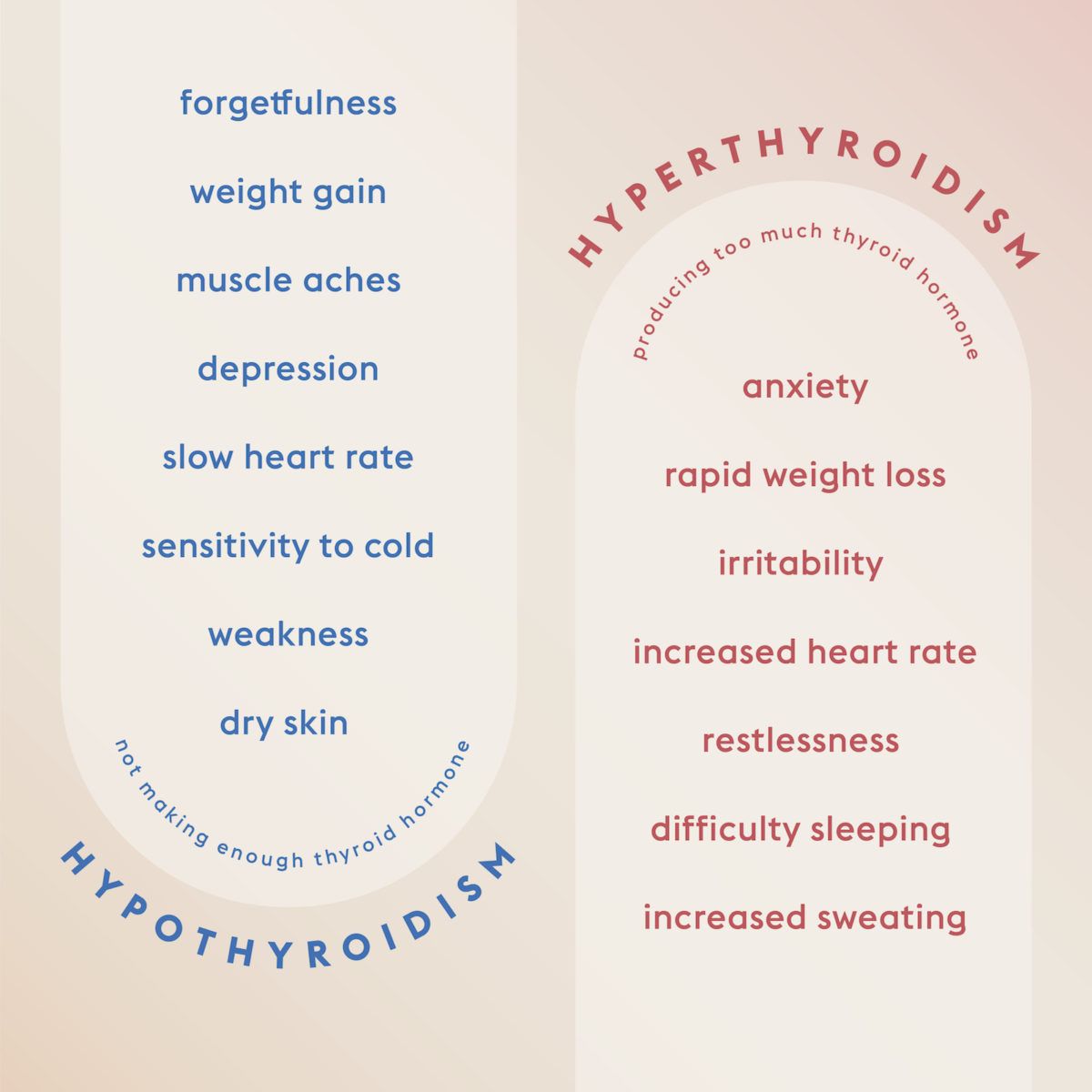Wondering how to heal your thyroid? Stress and diet play key roles in thyroid function, so it’s smart to make lifestyle and dietary changes part of your treatment plan for healing your thyroid.
The thyroid is a small gland with a big impact. When working correctly, it regulates essential hormones in the body. If usual thyroid operations are disrupted, the thyroid may cause weight changes, low energy, and other disruptive symptoms. For anyone experiencing a thyroid disorder, it's normal (and healthy) to research how to heal your thyroid.
While medication is the traditional solution, it's not the only one. And it's not always the most effective. Your diet, stress levels, and lifestyle choices play a huge role in thyroid health too.
What are thyroid problems?
Affecting an estimated 20 million Americans, thyroid disease is a common health issue. "We see thyroid problems very frequently in our practice,” says Gabriella Safdieh, MD, a pediatrician and rheumatologist formerly at Parsley Health New York. Hypothyroidism, or an underactive thyroid, is the most common among her patients, she says, while hyperthyroidism, or an overactive thyroid, is less prevalent.
The thyroid is a small gland at the front of the neck. It’s part of the endocrine system and produces hormones T3 and T4 which help regulate many processes and organs in the body. “Many people don’t realize the thyroid is one of the master glands in our body,” Safdieh explains. “Not only does it control energy levels and metabolism, but it also helps to control mood and can play a role in depression and anxiety.” So when the thyroid isn’t working properly, it can affect everything from body temperature and metabolism to mood and digestion.
“We see a lot of something called Hashimoto’s thyroiditis, which is an autoimmune disease,” Safdieh notes. In fact, autoimmune thyroid disorders are the most common autoimmune diseases. Hyperthyroidism can be caused by an autoimmune disease called Graves’ disease, and Hashimoto’s is the most prevalent cause of hypothyroidism. “With Hashimoto’s, your body starts producing antibodies against your own thyroid,” Safdieh says. The result is an inflamed thyroid that’s not able to do its job.
To discover if someone has a thyroid problem, doctors will commonly order a few blood tests to look at thyroid-stimulating hormone (TSH) levels. For the most comprehensive blood test, work with a functional medicine provider. They will order a panel that tests for more, including TSH, free T3, free T4, reverse T3, and thyroid antibodies (TPO and TgAb). This often results in a more complete picture of thyroid function.
What causes thyroid problems?
Thyroid issues can be caused by a variety of factors, Safdieh says, and for many people, there is a genetic component. But in the case of autoimmune thyroid disorders, there is always a “trigger” that causes onset. If this is the case, healing your thyroid naturally is possible.
Potential triggers include:
That last factor is a big one, particularly for hypothyroidism. Your adrenal glands sit on top of your kidneys and are also part of the endocrine system. One of their functions is to help manage stress response. “Whether it’s from chronic exhaustion or constant anxiety, too much stress on the adrenal glands can trigger hypothyroidism,” Safdieh says.
What’s more, poor sleep quality, lack of exercise, and a poor diet can increase inflammation in the body, which then predisposes you to autoimmune disease, Safdieh explains.

How are thyroid issues treated?
Typically, hypothyroidism is treated with a medication called Synthroid, or levothyroxine, which increases levels of T3 and T4. Patients taking levothyroxine or synthroid are then monitored by an endocrinologist who looks for changes in TSH Levels. They’re also monitored clinically to be sure that symptoms they are experiencing are getting better and that they aren't taking too much levothyroxine or synthroid. Hyperthyroidism is also usually treated with antithyroid drugs in a similar manner.
At Parsley Health, our healthcare providers try to take a natural approach to thyroid healing. “While some patients may still need medication, we rely on nutrition and lifestyle changes to help manage these conditions.” Through a balanced diet and lifestyle changes, some patients are able to lower the dosage of their medication, come off of it entirely, or improve symptoms of their thyroid condition. Here are eight thyroid healing practices you can start today.
1. Get adequate iodine levels.
One nutritional trigger for hypothyroidism is low (or high) iodine levels. "Iodine is important to maximize thyroid function, so getting the right amount can help give you a boost,” Safdieh says. The best way to check iodine levels is through blood work. A functional medicine provider can help you interpret blood work results and adjust the iodine in your diet accordingly.
Since the body can’t make iodine, it’s important to choose foods that contain it. Safdieh recommends focusing on sea vegetables like seaweed and kelp, but iodine is also found in iodized salt, fish, and eggs.
2. Manage your stress.
“Chronic stress can impair thyroid function,” Safdieh says. Under stress, your body produces the hormone cortisol. But too much cortisol can negatively impact thyroid hormone production, making it difficult for the gland to work properly, so working to reduce stress can help you heal your thyroid. “Practices like meditation and deep breathing exercises can make a big difference,” Safdieh adds.
3. Eat enough selenium.
Maintaining a sufficient level of selenium is important for preventing and healing thyroid issues. Thyroid healing foods that contain this essential mineral include Brazil nuts, legumes, and eggs. While you can take a selenium supplement, experts agree it’s not necessary. A study in The American Journal of Clinical Nutrition found that eating just two Brazil nuts per day worked just as well for increasing selenium levels as taking a supplement.
4. Consume zinc-rich foods.
Similarly, a zinc deficiency can put you at risk for hypothyroidism, since zinc helps to regulate the immune system and thyroid. A double-blind placebo controlled trial published in the Journal of the American College of Nutrition found that zinc and selenium supplementation, as well as zinc alone, helped improve thyroid function. But for most people, supplementation isn’t necessary. Zinc can be found in foods like oysters, meat, poultry, and organ meat. Plant-based sources include beans, nuts, and whole grains.
5. Prioritize gut health.
As we learn more about gut health and the microbiome, it’s becoming clear that the gut microbiome plays a role in many health concerns, including thyroid disorders. “It’s important to optimize gut function through lifestyle changes because the majority of the immune system resides in the gut,” Safdieh explains. “Gut bacteria actually assist in the conversion of T4 into T3, which is one of the key steps that needs to occur to increase thyroid function.”
If you have gut issues, consult a functional medicine provider who can conduct a gut assessment and make personalized recommendations, such as adding the right probiotics. Safdieh often recommends avoiding inflammatory foods, such as refined sugars, dairy, overly processed foods, and gluten and adding in gut-healing foods.
6. Start strength training.
“Exercise, specifically strength training, helps build muscle, which indirectly affects thyroid health,” Safdieh says. Taking up an exercise habit may also help to reduce stress, and can help you maintain a healthy weight. Weight gain is a concern for many people with hypothyroidism, since it slows down your metabolism, making it more difficult to lose or maintain your weight.
7. Improve your sleep routine.
Not getting enough sleep can add to your body’s stress load, so prioritizing quality shuteye is key to healing your thyroid, according to Safdieh. One study published in the Annals of Occupational and Environmental Medicine even found that night shift workers, who typically have poorer sleep quality, are at higher risk for thyroid diseases than people who work a daytime schedule. There are lots of ways you can get better sleep, from developing a nighttime routine to limiting caffeine intake during the day.
8. Look into anti-inflammatory supplements.
“Any supplements that can help to decrease general inflammation in the body can be helpful,” Safdieh says. “That includes omega fatty acids like fish oil, curcumin, which is the key ingredient in turmeric, and vitamin D.” Before starting any supplements or vitamins to help treat a thyroid disorder, though, it’s a good idea to check in with your health care practitioner about dosage and potential interactions with other medications you’re taking.
Final Thoughts
If you suspect you have a thyroid problem, the first step is to find a functional healthcare provider who can help. As you and your healthcare provider look at how to heal your thyroid, keep in mind:
- Medication isn't the be-all, end-all: While medication is the conventional approach and may be helpful, it's not the only way to address thyroid problems.
- Focus on gut health: What you eat influences your thyroid. Try to focus on zinc-rich foods and meals that are gut-friendly. Getting enough iodine and selenium is also important.
- Adjust your lifestyle: Alongside diet, make lifestyle changes that benefit the thyroid, such as strength training and stress management. You may also want to improve your sleep habits.
Ready to take control of your thyroid health? Schedule a free call to learn more about our root-cause approach, how to pay for Parsley Health with insurance, and how we can personalize your health journey.



